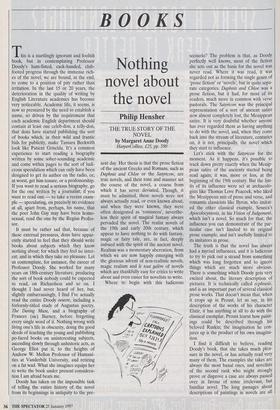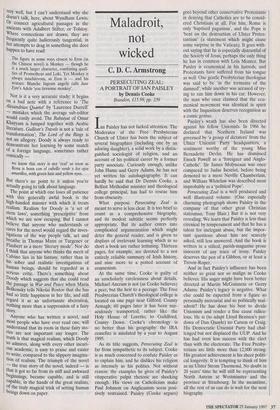BOOKS
Nothing novel about the novel
Philip Hensher
THE TRUE STORY OF THE NOVEL by Margaret Anne Doody HarperCollins, £25, pp. 580 This is a startlingly ignorant and foolish book, but in contemplating Professor Doody's ham-fisted, tack-handed, club- footed progress through the immense rich- es of the novel, we are bound, in the end, to come to a position of pity rather than irritation. In the last 15 or 20 years, the deterioration in the quality of writing by English Literature academics has become very noticeable. Academic life, it seems, is now so pressured by the need to establish a name, so driven by the requirement that each academic English department should contain at least one celeb-don, a telly-don, that dons have started publishing the sort of books which, in their wild and frantic bids for publicity, make Tamara Beckwith look like Patient Griselda. It's a common experience to start reading a biography written by some sober-sounding academic and come within pages to the sort of ludi- crous speculation which can only have been designed to get its author on the radio, or, at worst, get him tenure, or a professorship. If you want to read a serious biography, go for the one written by a journalist; if you want to read one — to take a recent exam- ple — speculating, on precisely no evidence at all, apart from, perhaps, his name, that the poet John Gay may have been homo- sexual, read the one by the Regius Profes- sor.
It must be rather sad that, because of these external pressures, dons have appar- ently started to feel that they should write books about subjects which they know nothing about; for which they feel no inter- est; and in which they take no pleasure. Let us contemplate, for instance, the career of Professor Doody. She worked for many years on 18th-century literature, producing the sort of book nobody could be expected to read, on Richardson and so on. I thought I had never heard of her, but, slightly embarrassingly, I find I've actually read the entire Doody oeuvre, including a forlornly-titled study of Augustan poetry, The Daring Muse, and a biography of Frances (sic) Burney, before forgetting every single word of it. Nothing wrong with living one's life in obscurity, doing the good deeds of teaching the young and publishing po-faced books on uninteresting subjects, ascending slowly through unhistoric acts, as George Eliot put it, to the heights of Andrew W. Mellon Professor of Humani- ties at Vanderbilt University, and retiring on a fat wad. What she imagines equips her to write the book under present considera- tion I am afraid beats me.
Doody has taken on the impossible task of telling the entire history of the novel from its beginnings in antiquity to the pre- sent day. Her thesis is that the prose fiction of the ancient Greeks and Romans, such as Daphnis and Chloe or the Satyricon, are true novels, and their tone and manner set the course of the novel, a course from which it has never deviated. Though, it must be admitted, these novels were not always actually read, or even known about, and when they were known, they were often denigrated as 'romances', neverthe- less their spirit of magical fantasy always pervaded the novel. The realist novels of the 19th and early 20th century, which appear to have nothing to do with fantasy, magic or fairy tale, are, in fact, deeply imbued with the spirit of the ancient novel. Realism was a momentary aberration, from which we are now happily emerging with the glorious advent of non-realistic novels, magic realism and le tout galere of novels which are thankfully easy for critics to write about and even easier for novelists to write.
Where to begin with this ludicrous scenario? The problem is that, as Doody perfectly well knows, most of the fiction she sets out as the basis for the novel was never read. Where it was read, it was regarded not as forming the single genre of `prose fiction' or 'novels', but in quite sepa- rate categories. Daphnis and Chloe was a prose fiction, but it had, for most of its readers, much more in common with verse pastorals. The Satyricon was the principal representation of a sort of ancient satire now almost completely lost, the Menippean satire. It is very doubtful whether anyone has ever regarded them as having anything to do with the novel, and, when they come back into the stream of literature, centuries on, it is not, principally, the novel which they start to influence.
Let's stick with the Satyricon for the moment. As it happens, it's possible to track down pretty exactly when the Menip- pean satire of the ancients started being read again; it was, more or less, at the beginning of the 19th century. But the lim- its of its influence were set at archaeolo- gists like Thomas Love Peacock, who liked the Menippean mix of prose and verse, and romantic classicists like Byron, who imitat- ed the other classical example, Seneca's Apocolocyntosis, in his Vision of Judgement, which isn't a novel. So much for that; the influence you can demonstrate of the par- ticular case isn't limited to its original prose example, and isn't usefully limited to its imitators in prose.
The truth is that the novel has always had a myriad influences, and it is ludicrous to try to pick out a strand from something which was long forgotten and to ignore things which are much more obvious. There is something which Doody gets very excited about, the literary description of pictures. It is technically called ecphrasis, and is an important part of several classical prose works. That doesn't mean that, when it crops up in Proust, let us say, in his description of the works of his character Elstir, it has anything at all to do with the classical exemplar. Proust learnt how paint- ings could be described through his beloved Ruskin; the imagination he con- jures up is the product of his own imagina- tion.
I find it difficult to believe, reading Doody's book, that she takes much plea- sure in the novel, or has actually read very many of them. The examples she takes are always the most banal ones, and novelists of the second rank who might strongly prove or disprove a case are always passed over in favour of some irrelevant, but familiar novel. The long passages about descriptions of paintings in novels are all very well, but I can't understand why she doesn't talk, here, about Wyndham Lewis. Or connect agricultural passages in the ancients with Adalbert Stiffer, or Tolstoy. Where connections are drawn, they are frequently quite ludicrously tangential, in her attempts to drag in something she does happen to have read: The figure in some ways closest to Eros (in the Chinese novel) is Monkey — though he is a much larger character, combining quali- ties of Prometheus and Loki. Yet Monkey is always mischievous, as Eros is — and his avatars: Blanche Ingram angrily calls Jane Eyre's Adele 'you tiresome monkey'.
Nor is it a very accurate study; it begins on a bad note with a reference to 'The Alexandrian Quartet' by 'Laurence Durrell' — mistakes which the average sub-editor would easily avoid. The Rubaiyat of Omar Khayyam is lumped together with Arabic literature. Gulliver's Travels is not a 'tale of transformation'; The Lord of the Rings is not an allegory. Doody is always ready to demonstrate her learning by some snatch of a foreign language, sometimes rather Comically - we know this story is not 'real' as soon as Rosa is born con el cabello verde y los Ojos arnarillos, with green hair and yellow eyes.
But there's no point to it unless you're actually going to talk about language. The point at which one loses all patience With this generally awful book is the high-handed manner with which it treats realism. Realism for Doody is 'a set of stern laws', something 'prescriptive' from which we are now escaping. But I cannot believe that anyone who understands or cares for the novel would regard the inves- tigations of the way people talk, act and breathe in Thomas Mann or Turgenev or Flaubert as a mere 'literary mode'. Nor do I think that anyone who thinks the merit of Calvin() lies in his fantasy, rather than in his sober and realistic investigations of human beings, should be regarded as a serious critic. There's something about Doody which suggests that she could read the passage in War and Peace when Maria Bolkonsky tells Nikolai Rostov that she has had so little happiness in her life, and still regard it as an unfortunate aberration, nothing more than a suppression of a fairy story.
Anyone who has written a novel, and most people who have ever read one, will understand that its roots in these fairy sto- ries are not important any longer. The truth is that magical realism, which Doody so admires, along with every other incuri- ous academic, is easy to praise and easier to write, compared to the slippery imagina- tion of realism. The triumph of the novel the true story of the novel, indeed — is that it got so far from its stiff and awkward beginnings, became capable, and is still capable, in the hands of the great realists, of the truly magical trick of setting human beings down on paper.



































































 Previous page
Previous page